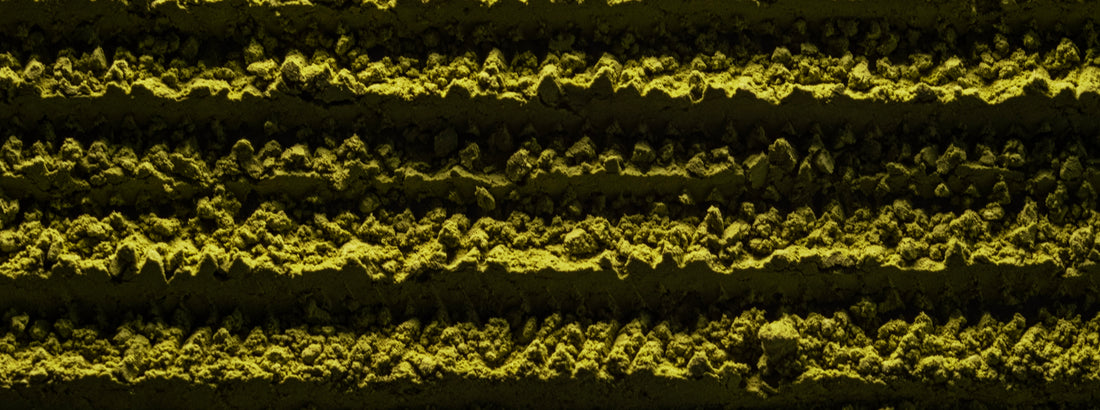
Matcha ingredients
Share
The secrets of the Matcha ingredients: A deep insight into the world of green gold
Matcha, the bright green powder made from finely ground green tea leaves, has seen a remarkable rise in popularity in recent years. Not only known as a traditional Japanese tea ceremony, but also as a superfood in the Western world, matcha has found its place. But what makes matcha so special? The answer lies in its ingredients. In this blog post, we delve deep into the world of matcha ingredients and discover what makes this green gold so powerful and healthy.1. 100% organic green tea from Japan
At the heart of high-quality matcha is the 100% pure organic green tea from which it is made. These tea plants, e.g. grown in the Kagoshima, Uji or Nishio regions of Japan, are carefully cultivated to ensure the highest standard of quality and purity. To make matcha, the tea plants are shaded for a few weeks before harvest to increase the chlorophyll content and give the leaves their characteristic deep green color. This practice also leads to an increase in amino acids, especially L-theanine, which have a relaxing effect on the body.
The leaves used for matcha are the young, tender leaves of the plant, which are carefully harvested and stripped of stems and veins before being ground into a fine powder. This process ensures that the tea retains its pure, unadulterated flavor and health benefits. Using organic farming also ensures that the matcha is free from pesticides and chemical fertilizers, making it a safe choice for all health-conscious people.
2. Antioxidants: Nature’s powerhouses
One of the most well-known and sought-after ingredients in matcha is the antioxidants that are present in high concentrations in each teaspoon of the green powder. In particular, the antioxidant epigallocatechin gallate (EGCG) is abundant in matcha. EGCG belongs to catechins, a special class of antioxidants found in green tea and known for their potential health benefits.
Antioxidants are important because they fight free radicals in the body that can cause cellular damage. This cellular damage is linked to a variety of chronic diseases, including heart disease, cancer, and diabetes. By consuming matcha regularly, you can help your body minimize this damage and promote your overall health.
3. L-Theanine: Relaxation without fatigue
L-theanine is an amino acid found in tea leaves and is found in high concentrations in matcha. This amino acid is known to have a calming effect on the mind without causing drowsiness. Unlike other caffeinated drinks that often cause nervousness or "ups and downs" in energy levels, matcha provides a balanced and long-lasting energy boost thanks to L-theanine.
L-theanine promotes the production of alpha waves in the brain, which are associated with a state of alert relaxation. This state is ideal for concentration and mental clarity, making matcha a perfect drink for long work days or intense study sessions. Together with caffeine, L-theanine creates a synergistic effect described as "calm alertness," making it ideal for getting through the day focused and relaxed.
4. Vitamins and minerals: A nutrient powerhouse
Matcha is also rich in vitamins and minerals that are essential for overall health. It contains vitamin A in the form of beta-carotene, which is important for eye health and the immune system. Vitamin C, another powerful antioxidant, supports the immune system and skin health. In addition, matcha provides a good dose of vitamin K, which plays an important role in blood clotting and bone health.
In addition to vitamins, matcha also contains important minerals such as potassium, which is essential for regulating blood pressure and supporting muscle and nerve function. Calcium and iron are also found in matcha, with calcium being important for bone health and iron being important for oxygen transport in the blood. These micronutrients help make matcha a complete nutritional supplement that strengthens you from the inside out.
5. Dietary fiber: supports digestion
An often overlooked benefit of matcha is its fiber content. Since matcha is made from whole tea leaves that are ground into powder and consumed whole, it also contains all the fiber that is present in the leaves. Fiber is essential for healthy digestion and helps regulate blood sugar levels and promote long-lasting satiety.
Matcha therefore not only helps to supply your body with important nutrients, but also supports healthy digestion and can help reduce cravings for unhealthy snacks by promoting a natural feeling of satiety.
Conclusion: Matcha as a holistic superfood
Matcha's ingredients make it a true superfood that supports both the body and the mind. With its high concentration of antioxidants, vitamins, minerals and amino acids, matcha offers a variety of health benefits. Whether as a calming drink that provides energy or as an ingredient in creative recipes - matcha is a true all-rounder.
By choosing high-quality, organically grown matcha from Japan, you ensure you get the most out of every teaspoon. From supporting immune function to promoting mental clarity to improving overall health, matcha is a valuable companion on the path to a healthier lifestyle. So next time you reach for your cup of matcha, remember that you're not only enjoying a delicious tea, but you're also feeding your body a wealth of nutrient-rich ingredients that will strengthen you from the inside out.
